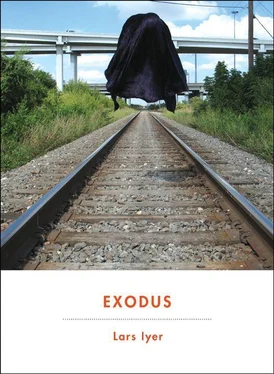Some escaped. Some went elsewhere. But others fell back into Britishness — fell into the drowning pool of Britishness. They drowned, gasping for air, finding no air, in Britain.
Hadn’t they seen too much? Hadn’t they learnt what they lacked? Hadn’t they a sense now of great thought, of great politics? Hadn’t their skies been full of light, full of the heavenly fire?
Essex University. God, what a terrible campus! The towers are like the towers of Mordor, we agree. Like the Crags of Doom. In the tiny bathroom on our floor, a neon light flashes on and off. I bring W. to show him. It’s like something from David Lynch, we agree. It feels like a symbol, but of what? There’ll be a murder here, later, we agree. Or a suicide. One or other of us will throw ourselves from the tower, from one of the crags of doom. Or perhaps we’ll both hurl ourselves down to the concrete …
To Wivehoe! W. cries, with a sudden show of longing …
The Essex postgraduates all lived in Wivenhoe, a fishing village not far from the campus, W. says. There, they would stroll singly or in pairs along the river. I’m taking the river air , one postgraduate would say to another, as they passed. We’re taking the ozone , one pair of postgraduate strollers would say to another.
The thinker needs a milieu, W. says. A place to think. Kant in his Konigsberg, walking the same route every day. Kierkegaard in his Copenhagen, wandering among the crowds …
The thinker needs regularity! External structure! The thinker needs discipline, if he’s in it for the long haul, W. says.
Structure and discipline: isn’t that what I lack? W. says. I am a chaotic man, he says. A man without pattern.
Didn’t I lurch my way through my philosophical studies (my so-called studies)? W. says. Didn’t I twitch through my Sanskrit studies and flop through my musical studies? Didn’t I jerk as I tried to learn ancient Greek, and spasm as I tried to read Augustine in the original?
Of course, you can’t study on your own, that was my mistake, W. says. You need to be part of something, part of a larger whole. You have to be able to believe in yourself as a scholar, W. says. As a would-be philosopher! And you have to be able to believe that the world might be changed as a result of your thinking. That it will all lead somewhere!
They believed in themselves, W. says: that’s what marked them out, he and his fellow Essex postgraduates. They believed in the importance of what they were studying. They believed in their own youth, their own promise. Why, they could be new Spinozas, new Scotuses! Oh, they knew that no one would read them, W. says. They knew that there was no chance of finding an academic job, of getting a lectureship. They knew that their legacy would never be passed down to the next generation. Theirs was a last stand : it was quite obvious to the Essex postgraduates. Theirs was the last chance of thought.
W. set himself a particularly rigorous schedule of study when he lived in Wivenhoe, he says. Four hours at his desk, and then a walk to take the ozone … A light lunch, followed by practice at his classical guitar … An hour at his German, or an hour at his Greek. An hour at his Hebrew … Then four more hours at his desk before dinner. And after dinner, a walk along the river, W. says. A walk to take the ozone, and to let his studies of the day knit themselves together in his head …
There were dozens of Essex postgraduates living in Wivenhoe. Dozens, for whom philosophy was life itself , for whom Wivenhoe might as well have been ancient Athens or Enlightenment Jena. They lived in poverty, of course, W. says. They lived on welfare. They barely ate. They drank, of course. They drank a great deal!
The British person has to drink in order to do philosophy, W. says. To drink away their Britishness! Their uptightness! Their reservedness! Their aversion to discussion! To looking one another in the eye!
Centuries of positivism have left their scars on Britain, W. says. Centuries of the hatred of metaphysics, of religion! The British have the worst possible attitude to intellectual speculation, W. says. They are the most provincial of people. The most inward-looking of people. The most suburban !
Really, British thought is a contradiction in terms, W. says. British ideas! The British intellectual is an oxymoron, he says, because the British despise intellectuals. Because British intellectuals despise themselves.
How they drank, the Essex postgraduates! W. says. They needed to drink! They had to drink! Drinking was a discipline, for the Essex postgraduate. And smoking! How they smoked! W. says. The British would-be thinker has to smoke, W. says. To strike against their health and vitality. Against rosy cheeks! Against bright eyes!
Only ill-health can shatter British complacency, W. says. Only late nights and despair! The Essex postgraduates knew they had to declare war on themselves, if they were to think. They knew they had to destroy the reign of Britain in their souls, W. says.
The bus hurtles through the countryside, branches crashing against the windows. A bus full of academics! A bus full of enemies! — ‘Oh God!’, W. wails.
Academic philosophers hate real philosophers, W. says. Just as scholars of music hate real musicians. Just as scholars of literature hate poets and novelists. They hate us! W. says, of our fellow passengers. They hate him !
Oh, they don’t hate us personally, W. says. They don’t even know us. They’re completely indifferent to us! That’s part of the problem. — ‘Do you think anyone on this bus knows our names? Of course not!’ But they would hate us, if they knew us. They would lynch us immediately, if they understood anything about us.
We should be going to Wivenhoe, W. says. But the conference bus is heading in the opposite direction. Ah, why did we get on board? Why do we always do what’s wrong for us?
The conference dinner. Alain Badiou, sitting all alone.
Why don’t we ask to join him? Why don’t we introduce ourselves, and sit down beside him? W. could speak in his soft French, and I could fetch a bottle of wine and some glasses.
We could lament the fatuity of what passes itself off as ethics in both public discourse and the university, and analyse the supplanting of real philosophy by so-called applied ethics (badminton ethics). We could mull over the origin of the great French philosophy of the ’60s, and the decline of German Critical Theory since the ’60s.
We could agree, too, that the world-historical mission of philosophy is far from over, far from gone. We could agree that there is to be no more ‘continental’ woolliness, no more Derridean equivocation: that the time has come to think clearly, decisively!
We could reflect on the destiny of the notion of the infinite in both philosophical thought and mathematical thought. We could muse upon Koch Curves and the Kimberling shuffle , upon non-averaging sets and non-dividing sets , and consider the nature of love, of art, of politics, of science, as forms of truth .
And perhaps Badiou could entertain us with anecdotes of his own life as a thinker, and perhaps we could entertain him with some anecdotes of our own …
But why should Alain Badiou want to speak to us? He’s a man of rigour and mathematical precision! He’s a man of politics, of real political commitment!
On Saturday morning, when W. is eating crumpets with Sal, and I’m still lying in bed, Badiou has already jotted down a few notes for Being and Event III ; he’s already drafted an obituary essay for a dead fellow thinker — a thought-enemy, granted, but a worthy adversary. He’s already spoken to Sylvain Lazarus on the phone, about their campaign for the sanspapiers …
Читать дальше












